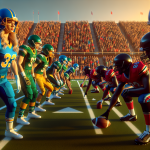In the world of American football, rule changes are not taken lightly. They are carefully considered by the NFL Competition Committee, a group that takes input from various stakeholders such as coaches, general managers, team owners, players, and medical professionals. This committee reviews game footage and engages in discussions before recommending any new rules.
Once these rules are established, they are effectively communicated to players, coaches, and officials during off-season meetings and through training resources to ensure everyone is on the same page. This ensures that the integrity and safety of the game are maintained.
One of the most significant changes implemented this season is the ban on the “hip-drop” tackle, a move that has been linked to numerous injuries in the past year. This dangerous tackle involves a defender grabbing a runner, swiveling, and then dropping their hips onto the ball carrier’s legs, often resulting in severe injuries like broken bones or torn ligaments.
The NFL reported that the hip-drop tackle had caused a high injury rate, surpassing that of standard tackles. Under the new rule, using a hip-drop tackle will lead to a 15-yard penalty and an automatic first down. This change aims to protect players from unnecessary harm on the field.
Furthermore, a crucial rule change allows instant replay to determine whether a quarterback’s knee was down before releasing a pass. This offers a fairer and more accurate way to officiate the game, ensuring that the right calls are made on the field.
The expanded use of instant replay now includes reviews on whether a player stepped out of bounds. If a player is initially ruled to have stayed inbounds but replay shows otherwise, the call can now be corrected. Similarly, if a quarterback is ruled out of bounds but replay indicates they released the ball while still inbounds, the play will be marked at the point of catch or interception, without allowing further advancement.
These rule changes not only impact the gameplay but also prioritize the safety and fairness of the sport. With input from various stakeholders and careful consideration by the NFL Competition Committee, these changes aim to improve the overall experience for players, coaches, and fans alike.






